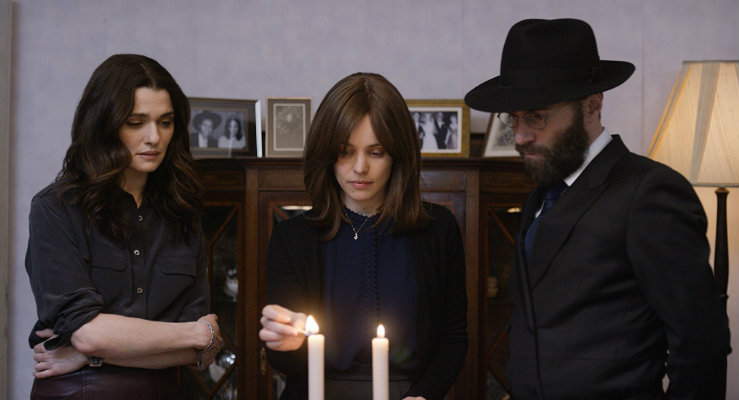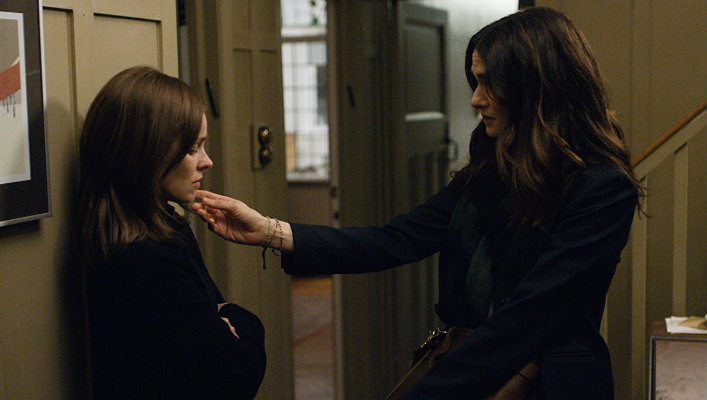Disobedience — a queer love story set in an Orthodox Jewish community in London — is an authentic, honest, and revealing movie. It makes you confront your own raw feelings of fear, love, and defying everything simply to live your truth.
The movie hails from Chilean filmmaker Sebastián Lelio, whose trans movie A Fantastic Woman won Best Foreign Language Film at the Oscars this year. It is based on the novel of the same name by Naomi Alderman.
Ronit Krushka (Rachel Weisz) returns to her childhood home, a community of Orthodox Jews, after her father, a rabbi, dies. She left years ago, following the discrimination and fear faced after the attraction between her and her childhood friend, Esti (Rachel McAdams), was discovered.
Upon returning, Ronit discovers Esti is married to their other childhood friend, Dovid (Alessandro Nivola). However, when old feelings return, they must confront their own ideas of identity, faith, and happiness.
The following review contains minor spoilers.
Take a deep breath
The movie opens slowly, allowing its story and characters to breathe. It does not rush into anything — Lelio, an apt filmmaker, allows you to wade into this community and understand its place, culture, and meanings.
Watching this movie is a visceral experience, one that you feel to your very core. At the start, you breathe slow and deep, wondering about the secrets. As the story begins to unfold, suddenly you find yourself holding your breath, waiting for the plunge. It is a common thing with movies about the queer experience and identity.
Falling in love is a journey | Photo: IMDB/Bleecker Street
This movie, however, is — fortunately — filled to the brim with compassion and empathy. Lelio never treats his characters, and their truths, with anything less than respect.
This movie ends with the hope and peace of a new beginning. It’s worth saying up front, because tragic endings and struggles are all too common among stories about our community.
There is one particular scene involving all three childhood friends, and a hug, near the end of the film — it is a moment of love and acceptance everyone craves. It is the love in a story we deserve.
Mostly with the help from the composer, Matthew Herbert, and cinematographer, Danny Cohen, Disobedience is also beautiful. It adds to the experience of the film. It is full of soft close-ups and shots that hardly feel manufactured. The score is elegant, but Lelio also uses sound in a smart way. Several scenes are shot almost in silence, with a focus only on small diegetic sounds, like the lighting of a cigarette.
It all lends a sense of reality and tangibility to the movie.
This authentic truth
That is the perhaps the greatest accomplishment and joy of this movie. It feels real and authentic in nearly every way.
Ronit left the community — her sense of freedom and defiance is palpably felt throughout the movie. She’s now a photographer in New York City and has forgotten certain customs. When she returns to London after her father’s death, she nearly hugs Dovid before murmuring, “Oh, I’m sorry, I forgot.” Negiah is a concept of Jewish law that disallows men and women from touching (save for spouse and family).
Life is different for Esti.
She goes through the bigger transformation in the film, and the harder journey in learning to both accept herself and fight for the freedom she craves. She is attracted only to women, but unable to live that life. Instead she is recluse and reserved, married to Dovid, and shining only when she is with Ronit or her students at the all-girls school she teaches at.
Even with the religious element, Esti’s journey — one of figuring out who you are, embracing it, and then fighting for it — is a well-known one. It makes her story universal, despite its specific setting.
Learning what she faced after her relationship with Ronit was discovered as young girls is a punch to the gut. It shifts the movie entirely.
However, despite an instinct to lash out at this Orthodox Jewish community for its oppression of her, Lelio takes the opposite route. He shows Esti’s love and admiration for her own faith and community, and astutely shows why it is so difficult for her.
Certainly, there are characters in the story who say less than nice, progressive things, but Lelio never paints Orthodox Jews with bold strokes.
It respects and empathizes with both communities entirely.

Childhood friends | Photo: IMDB/Bleecker Street
We are all disobedient – and free
When Esti makes the decision to finally ask for her freedom and the life she craves, it is not one born out of misogyny or subservience to her husband. Rather, it reveals Esti’s internal struggles to marry both her faith and sexuality, a battle many know well.
The longing to be free is one felt within all of us, and one that often requires an act of defiance, such as love itself, to obtain.
In this way, everyone is disobedient. The idea of disobedience in Lelio’s movie is not one of shame. Instead, it is a necessary and brave one. Neither are Ronit and Esti the only characters who act disobediently, making the concept transcend its most base appearance in the film. Dovid, in his part, finds himself disobeying the community in his support of both Ronit and Esti as free women.
Sensuality liberated
The most talked about scene of the movie — the sex scene between Ronit and Esti — takes this idea even further. It is not simply a carnal transgression and an act of defying the community. It is beauty and love.
When Ronit and Esti finally give in to their feelings, the eyes and judgment of the community fall away. Their love takes its place front and center.
It is one of the most sensual and beautifully shot love scenes, especially involving two women. There is nothing sensational and gratuitious about it, but neither does it shy away from the honesty of nudity, pleasure, and desire. Plus, there is a complete lack of male gaze.
Part of it is thanks to Weisz’s role as producer. Weisz and Lelio both decided to remove a scene of Ronit having an orgasm so it would focus exclusively on Esti. ‘It was too many orgasms,’ Weisz said. ‘Esti’s was more important, and it robbed her of that.’
The movie provides both women with some of their career-best performances, McAdams especially. The physical, emotional, and mental transformation of Esti over the course of the film is stunning to watch. With McAdams’ turn as Esti, she gives her raw agency and honesty that we so crave to see in female characters. She is all at once vulnerable, rash, angry, scared, regretful. She experiences a full range of emotions that is very real for the LGBTQ community, and gets her happy ending.
This movie deserves to be and should be seen.
Disobedience comes out in the US on 27 April and in the UK on 28 September.
See also
Rachel Weisz addresses debate about straight actors playing LGBTI roles







